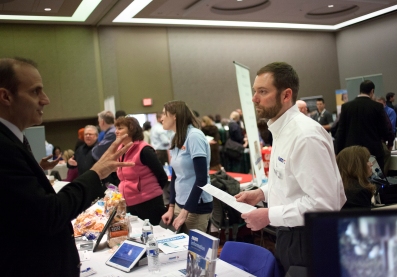
- Fordham GSAS and Career Services have launched a new initiative to promote professionalism among grad students. Courtesy of Flickr
By Andrew Morse
As part of an ongoing quest to prepare students for life after Fordham, the Fordham Graduate School of Arts and Sciences (GSAS) recently unveiled the Futures Program, a new initiative sponsored by the Graduate School and the Graduate Student Association in partnership with Career Services.
The inaugural forum and luncheon took place Wednesday, Nov. 12, in the O’Hare Special Collections Room in the Walsh Library.
GSAS Futures will strive to help students plan for success by providing graduate students with professional development seminars, leadership programs and training in new technologies. The initiative will also hold academic and collaborative careers skill building workshops and networking, along with career planning and mentoring.
“GSAS Futures complements the academic training and mentorship that graduate students receive at Fordham by providing forums and skills that are not necessarily fostered in graduate classrooms,” said James Van Wyck, GSAS senior higher education administration fellow and facilitator, GSAS Graduate Student Professionalization. The program’s events will be grouped into three segments: The Career Series, the Digital Series and the Communicating Scholarship Series.
As jobs in the academic world become more competitive, graduate schools must provide their students with a more diverse skill set and prepare them for professional careers in multiple fields.
“The program is designed to provide professionalization outside of the disciplines that the students are specifically studying in, with an eye to helping to prepare them for non-faculty job searches as well as the traditional faculty jobs that are out there,” said Leonard Cassuto, PhD., a professor of english and author of the monthly column “The Graduate Advisor” in The Chronicle of Higher Education.
“It meets a specific need, which is to prepare graduate student to search for and compete for openings in fields other than academia. This is particularly important at a time when professors’ jobs have become so competitive,” Cassuto said.
GSAS Futures aims to be dynamic in how it incorporates graduate students into the formation of the program.
“What is different about our program is that it is conceived not just for graduate students but by graduate students: it is a grass-roots kind of movement here,” said Eva Badowskia, PhD., acting dean of GSAS. “What GSAS is pursuing is balance in the training of our students: on the one hand, deep academic grounding in the disciplines and program areas and, on the other, broad professional skills applicable outside of these disciplines.”
Fordham is not the only school that has taken strides to enhance the preparedness of its graduate students. Michigan State University in its Prep program, and the University of Louisville Plan program, have began to adapt their approach to graduate education in the arts and sciences.
Alumni will also be very involved in GSAS Futures. “We consider alumni connections vital to the professionalization of our graduate students, particularly those students who are preparing for non-academic careers. Alumni, and in particular recently-graduated students, will play a key role in our programming for this year,” said Van Wyck. GSAS Futures will feature alumni panels, informational sessions and networking opportunities throughout their Career Series.
Dr. Laura Morreale, associate director of medieval studies at Fordham University and a Fordham GSAS PhD., believes Futures will have a substantive impact on GSAS students moving forward.“GSAS Futures will help students make the most of the valuable work they are doing here at Fordham,” said Morreale. “Learning to market the skills they acquire along the way will be key to their success as they move beyond their graduate programs and into the wider world.”
Futures will help Fordham’s GSAS adapt to, and compete in the ever changing professional world. Feedback and involvement from current students and alumni will only help the program grow.
“Our goal is to ensure that the programming we begin this year continues and improves from year to year. We’d love to continue to hear from GSAS students and faculty,” added Van Wyck.
